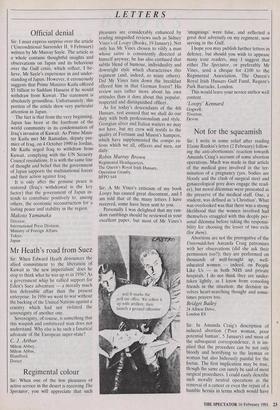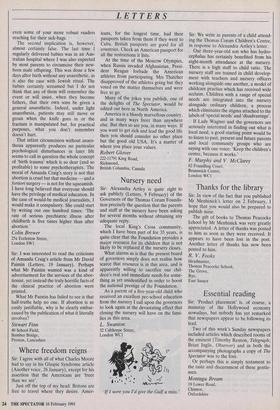Sir: In Amanda Craig's description of induced abortion (Poor woman,
poor potential human', 5 January) and most of the subsequent correspondence, it is im- plied that the procedure can be not only bloody and horrifying to the layman or woman but also hideously painful for the foetus. The first implication may be true, though the same can surely be said of most surgical procedures. I could easily describe such morally neutral operations as the removal of a cancer or even the repair of a humble hernia in terms which would have
LETTERS
even some of your more robust readers reaching for their sick-bags.
The second implication is, however, almost certainly false. The last time I regularly delivered babies was in an Aus- tralian hospital where I was also expected by most parents to circumcise their new- born male offspring. This was done a few days after birth without any anaesthetic, as is also the case with Jewish ritual. The babies certainly screamed but I do not think that any of them will remember the event or will insist, when they become fathers, that their own sons be given a general anaesthetic. Indeed, under light anaesthesia, patients may still move or groan when the knife goes in or the fracture is manipulated but, for practical purposes, what you don't remember doesn't hurt.
That infant circumcision without anaes- thesia apparently produces no particular psychological disturbances in later life seems to call in question the whole concept of 'birth trauma' which is so dear (and so profitable) to some psychotherapists. The moral of Amanda Craig's story is not that abortion is cruel but that medicine — and a fortiori surgery — is not for the squeamish. I have long believed that everyone should have the privilege of medical education. In the case of would-be medical journalists, I would make it compulsory. She could start by writing out one hundred times: 'The rate of serious psychiatric illness after childbirth is five times higher than after abortion.'
Colin Brewer
25a Eccleston Street, London SWI



















































 Previous page
Previous page